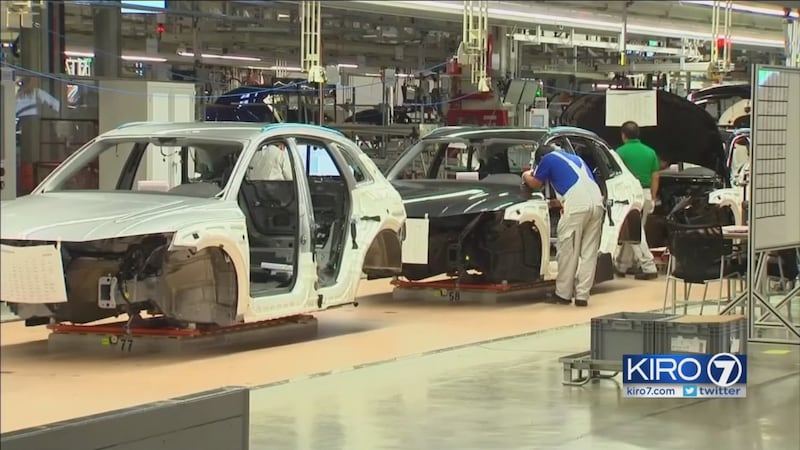The continent's new trade deal comes with a new name.
NAFTA is out. USMCA is in.
It stands for United States-Mexico-Canada Agreement.
"This new deal will be the most modern, up-to-date and balanced trade deal in the history of our country with the most advanced protections for workers ever developed," President Donald Trump said Monday.
"It's an agreement that removes uncertainty for our manufacturers and investors and improves labor rights for all North Americans," said Canadian Prime Minister Justin Trudeau.
The announcement comes after a deal between the U.S. and Mexico initially left out Canada, a major trading partner for neighboring Washington state.
Michael Fowler, senior trade consultant with World Trade Center Tacoma, said Washington should be viewing the new deal "very positively."
"I think any trading relationships we can stabilize would be great for business," Fowler said.
Scroll down to continue reading
More news from KIRO 7
- One dead after crash in front of Beth's Cafe on Aurora
- Woman stabbed to death in quiet Fife neighborhood
- Chain reaction crash on I-5 in Tacoma closes freeway for hours
- Yale classmate recalls Kavanaugh as frequent, heavy drinker
- Do you have an investigative story tip? Send us an email at investigate@kiro7.com
In a statement, Lori Otto Punke, President of the Washington Council on International Trade, wrote, “An integrated North American market, which this new USMCA continues, is critical to Washington state businesses, farmers, ranchers and workers. Washington state exports into Mexico have increased 700 percent, and exports to Canada have grown 200 percent since North American Free Trade Agreement (NAFTA) began.”
The new deal means more Washington dairy products can be sold in Canada.
In a statement, Darigold President and CEO Stan Ryan said Canadian dairy policies "dumped milk proteins on world markets and moved American dairy farming and processing jobs, along with thousands of additional high-quality jobs, from the U.S. to Canada."
Ryan wrote, "The U.S. Administration successfully halted this program at current levels, just as it was about to take off and expand."
In a win for Washington's wine industry, the trade deal also throws out a British Columbia law that relegated U.S. wines to separate shelves.
The agreement aims to boost manufacturing of car parts in North America.
By 2020, to avoid tariffs, a car must have 75 percent of its components manufactured on the continent, up from 62.5 percent.
A significant percentage of the assembly must be done by workers making at least $16 per hour, which is three times what people are paid in Mexico.
Rebecca Lindland is executive analyst for Kelley Blue Book, which has the same parent company as KIRO 7.
She talked about the potential impact of USMCA on car prices.
"Really pay attention to the price of the vehicle you're purchasing because we could see some increases here," Lindland said.
But Lindland also said the average price of a new car is already around $35,000.
"Consumers can't really afford significant increases in the prices of vehicles," Lindland said. "So we could see some decline in the profitability of manufacturers as they transition through this."
Environmental groups are among the early critics of the deal.
They say it has too many benefits for the fossil fuel industry and doesn't mention climate change.
The USCMA needs approval from Congress to take effect.
Cox Media Group








